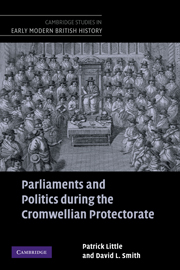Book contents
- Frontmatter
- Contents
- Preface
- List of abbreviations
- 1 Introduction: historiography and sources
- 2 Parliament and the paper constitutions
- 3 Elections
- 4 Exclusions
- 5 Factional politics and parliamentary management
- 6 Oliver Cromwell and Parliaments
- 7 Richard Cromwell and Parliaments
- 8 Law reform, judicature, and the Other House
- 9 Religious reform
- 10 Representation and taxation in England and Wales
- 11 Parliament and foreign policy
- 12 Irish and Scottish affairs
- 13 Conclusion
- Appendix 1 Members excluded from the Second Protectorate Parliament
- Appendix 2 The Remonstrance of 23 February 1657
- Bibliography
- Index
- Titles in the series
7 - Richard Cromwell and Parliaments
Published online by Cambridge University Press: 17 July 2009
- Frontmatter
- Contents
- Preface
- List of abbreviations
- 1 Introduction: historiography and sources
- 2 Parliament and the paper constitutions
- 3 Elections
- 4 Exclusions
- 5 Factional politics and parliamentary management
- 6 Oliver Cromwell and Parliaments
- 7 Richard Cromwell and Parliaments
- 8 Law reform, judicature, and the Other House
- 9 Religious reform
- 10 Representation and taxation in England and Wales
- 11 Parliament and foreign policy
- 12 Irish and Scottish affairs
- 13 Conclusion
- Appendix 1 Members excluded from the Second Protectorate Parliament
- Appendix 2 The Remonstrance of 23 February 1657
- Bibliography
- Index
- Titles in the series
Summary
Richard Cromwell's relationship with Parliaments inevitably stands in marked contrast to his father's relationship with them. Lord Protector for less than nine months compared to nearly five years, Richard's only Parliament consisted of a single session lasting less than three months. Furthermore, although Richard had been a member of both the first and second Protectorate Parliaments, he lacked the extended parliamentary experience that helps to set his father's handling of his Parliaments within a much longer context. Nevertheless, Richard's relations with Parliament deserve to be examined in their own right as an integral part of the parliamentary and political history of the Protectorate, and not merely to be seen as a codicil to the story told in chapter 6. This chapter will consider Richard's early career and parliamentary experience, and explore the development of his political and religious attitudes as reflected principally in his surviving speeches and correspondence. We will then turn to examine his relationship with the third Protectorate Parliament in 1659, and the reasons why that Parliament ultimately collapsed.
RICHARD CROMWELL'S EARLY CAREER
Richard was one month short of his 32nd birthday when he was proclaimed Lord Protector. Born on 4 October 1626, he was the third son of Oliver Cromwell and Elizabeth Bourchier. He was educated at Felsted School, probably served briefly in the Parliamentarian armies during 1647, and was admitted a member of Lincoln's Inn on 27 May 1647.
- Type
- Chapter
- Information
- Parliaments and Politics during the Cromwellian Protectorate , pp. 148 - 170Publisher: Cambridge University PressPrint publication year: 2007



